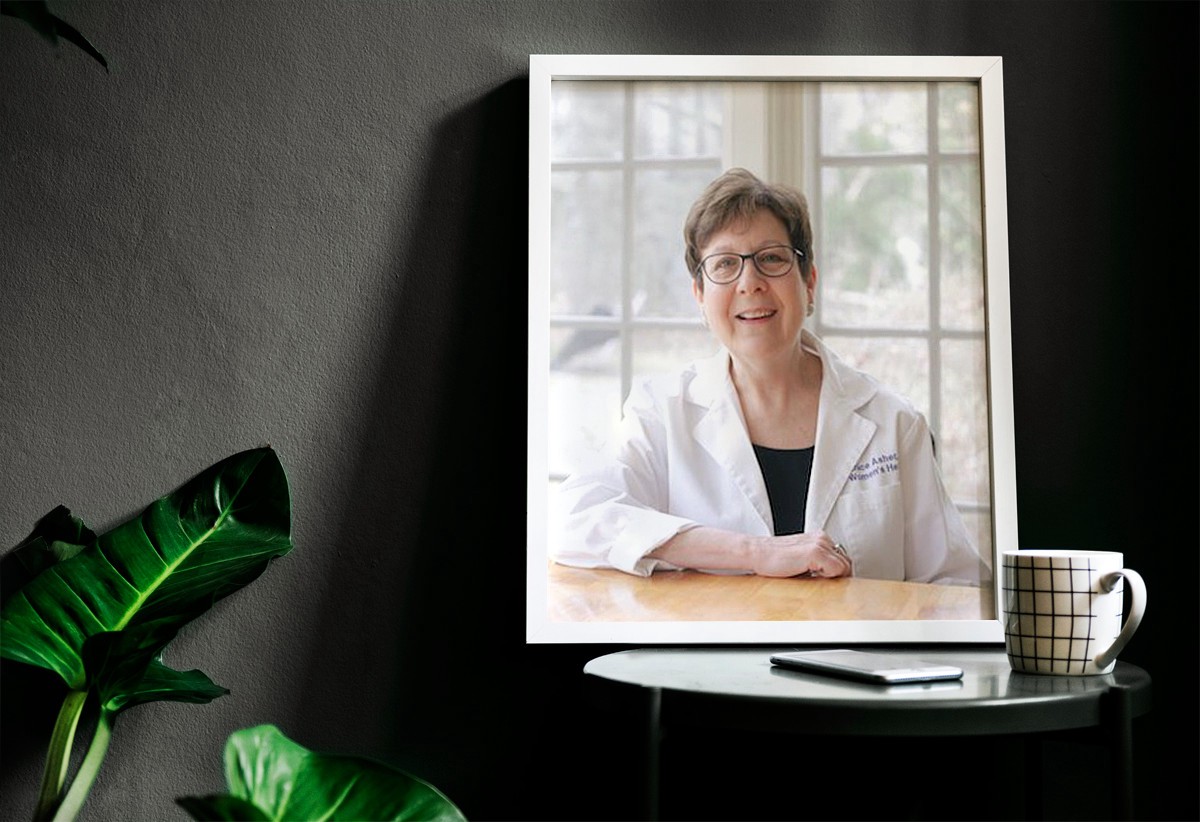The key to sustainable weight loss is not “willpower” and deprivation — it’s kindness toward yourself and letting go of shame. You want to lose weight and keep it off? You want to change your emotional relationship with food? If that’s what you want, the shame stops today. No, not when you lose weight. Today.
Asa part of my series about strong female leaders, I had the pleasure of interviewing Janice Asher, MD
Dr. Asher, is a board‑certified obstetrician/gynecologist at the University of Pennsylvania, where she served as the Director of Women’s Health at the Student Health Service (1989–2018) and also began the MILE (mindful, intuitive living & eating) program. She has counseled more than a hundred patients on adopting healthy eating habits and achieving sustainable weight loss. In her 60s, Dr. Janice lost 30 pounds and has kept the weight off for more than five years. She is happy to be living a life with less joint pain, more energy, and more joy.
Thank you so much for doing this with us Dr. Asher! Can you tell us a story about what inspired you to help other seniors live their best life?
Well, for one thing, I’m 70 years old — I am a senior! In my book, The Permanent Weight Loss Plan, I describe my “stepladder moment”:
I am on a stepladder, trying to reach into the back of the cabinet over the refrigerator. I am foraging for some old Halloween candy or anything else that’s chocolate. I know that it will be uncomfortable coming down off the ladder because my knees hurt. I know that my knees hurt in part because I have gained weight — a lot of weight — and now weigh exactly what I had weighed when I was 9 months pregnant. Just baby fat, right? Except that the baby is now twenty-three years old.
A single thought floats into my mind: You are pathetic. And then, thank goodness, another thought replaces it: This stops now. And it did. That’s the story I want to share with you.
I am a gynecologist who lost 30 pounds. Thirty pounds — big deal, you say. Well, it is a big deal. It’s a big deal because I’m in my sixties and had flunked every diet I’d ever been on. It’s a big deal because I’ve kept the weight off for more than five years, which is something only a small fraction of people who lose weight can say.
It’s a big deal because even though poor nutrition is the major cause of so many preventable diseases, I never learned much at all about healthy eating in medical school. So I had to develop my own strategies by reading all the recent medical research and by personal trial and error. The strategies I used — and continue to use — have been helpful to many of my patients, and that’s incredibly gratifying to me. Most of all, it’s a big deal because I’m really proud of myself and happy to be living a life with less pain and more joy.
Can you share the most interesting story that happened to you since you began this healthy movement?
After I lost the weight and was able to keep it off, I tried my strategies with my patients who were struggling with obesity. When many of them had success of their own, I created a group, which I led with a therapist and nutritionist, of people who wanted to address issues related to being “overweight.” We did not talk about calories or weights per se. Rather, we discussed the issues that arose for them around their weight. The common denominator? Shame. That was eye-opening for me (even though I had experienced those very same feelings myself). That is what led me to write my book, which I called “Eating Without Shame” (and which the publisher changed.
Can you share a story about the funniest mistake you made when you were first starting? Can you tell us what lesson you learned from this entire experience?
Many years ago, I had started yet-another unsuccessful diet attempt. I cringe to think back on how I actually announced to my young children that I was trying to lose weight. My 4-year old said to me, “Please don’t lose too much weight, Mommy — I like you fluffy.” What a wonderful perspective!
What do you think makes your book stand out from other weight loss books? Can you share a story?
My book is not a weight loss book! It is a book about healthy eating, healthy moving, healthy response to stress, healthy habits, and healthy self-image. Weight loss is the RESULT of making physically and emotionally healthy changes, not the specific end goal in itself.
Are you working on any exciting new projects now? How do you think that will help people?
Yes, I’m currently working on a project that’s very exciting to me. Pediatricians are concerned about the damage done by childhood obesity; psychologists are concerned about the damage done by the body-shaming of obese children. I want to explore the narrow path between those two things — to help parents, teachers — and all of us, for that matter –appreciate the importance of good health; while, at the same time, removing judgment about body size.
What advice would you give to others to help them thrive?
Here’s what I write in the book:
Diet books, weight loss promoters, and other “experts” will tell you that self-discipline and even deprivation are the keys to weight loss success. They claim that once you lose weight, you’ll live happily ever after and never, ever regain the weight or feel ashamed of your body. Of course, that’s not true…
The key to sustainable weight loss is not “willpower” and deprivation — it’s kindness toward yourself and letting go of shame. You want to lose weight and keep it off? You want to change your emotional relationship with food? If that’s what you want, the shame stops today. No, not when you lose weight. Today.
We suggest that… [the “experts”] have it exactly backward. We suggest you need to start with letting go of the shame about your eating and your body. If you do that, then you will be able to carry out a strategy that will result in weight loss that can be sustained for the rest of your life.
Let’s start with this premise: you are already worth taking care of.
None of us are able to achieve success without some help along the way. Is there a particular person who you are grateful towards who helped get you to where you are? Can you share a story about that?
Let me tell you about my co-author, a former patient of mine. She came to see me when she was a senior in college. She had lost 140 pounds in the prior two years through “simple diet and exercise.” When I learned her story, of her challenges as an obese child, as a biracial girl in a small, overwhelmingly white Midwest town, of her determination to succeed at a major Ivy League university (where she went on to graduate Phi Beta Kappa), I was overwhelmed. When she told me she was thinking of writing a book about her weight loss experience to motivate other people, I explained that I, too, was thinking of writing a book. I asked her if, after she graduated and was no longer my patient, she wanted to write a book together. And the rest is history.
How have you used your success to bring goodness to the world?
I think I truly had success with my patients with regard to appreciating what their bodies have done for them and to try to take care of their bodies in physically and emotionally healthy ways; while, at the same time, letting go of shame. I hope that my book and my continued writings will reach other people in the same way.
What are your “5 Leadership Lessons I Learned From My Experience” and why. (Please share a story or example for each.)
I’m not a leader. But I’ll share with you some lessons learned:
1.Telling patients they “need to lose weight” is usually useless and often shaming. People have brains, and they have mirrors. Instead, discuss the benefits of healthy eating, moving, and stress management as a way to enhance their lives and to treat their specific diseases and conditions.
2.You don’t necessarily have to love your body — but at least show it some respect. It got you out of bed today.
3.You can’t singlehandedly change our narrow-minded, body-shaming culture. But you can certainly stop body shaming yourself and others. No one’s weight is a measure of their worth.
4.You have a right to take care of yourself and to advocate for yourself — even more than other people in your household have a “right” to have cookies in the house.
5. When someone says something to you or about you, they’re saying something only about themselves. You can CHOOSE how you want to respond. If I’d learned this lesson sooner, I would have been better able to stand up to bullying men.
You are a person of great influence. If you could inspire a movement that would bring the most amount of good to the most amount of people, what would that be? You never know what your idea can trigger.
My movement would be to combine an effort to support people’s eating healthy, non-processed foods, while also supporting body-neutrality with regard to judgment and stigma.
Can you please give us your favorite “Life Lesson Quote”? Can you share how that was relevant to you in your life?
“You will never lose weight by hating yourself.”
Some of the biggest names in Health, Business, VC funding, Sports, and Entertainment read this column. Is there a person in the world, or in the US with whom you would love to have a private breakfast or lunch with, and why? He or she might just see this if we tag them
Michelle Obama (how can I resist? She embodies intelligence, compassion, wisdom, bravery, and a sense of humor)
How can our readers reach you on social media?
@drjaniceasher (Twitter)
Janice Asher, MD (Facebook)


